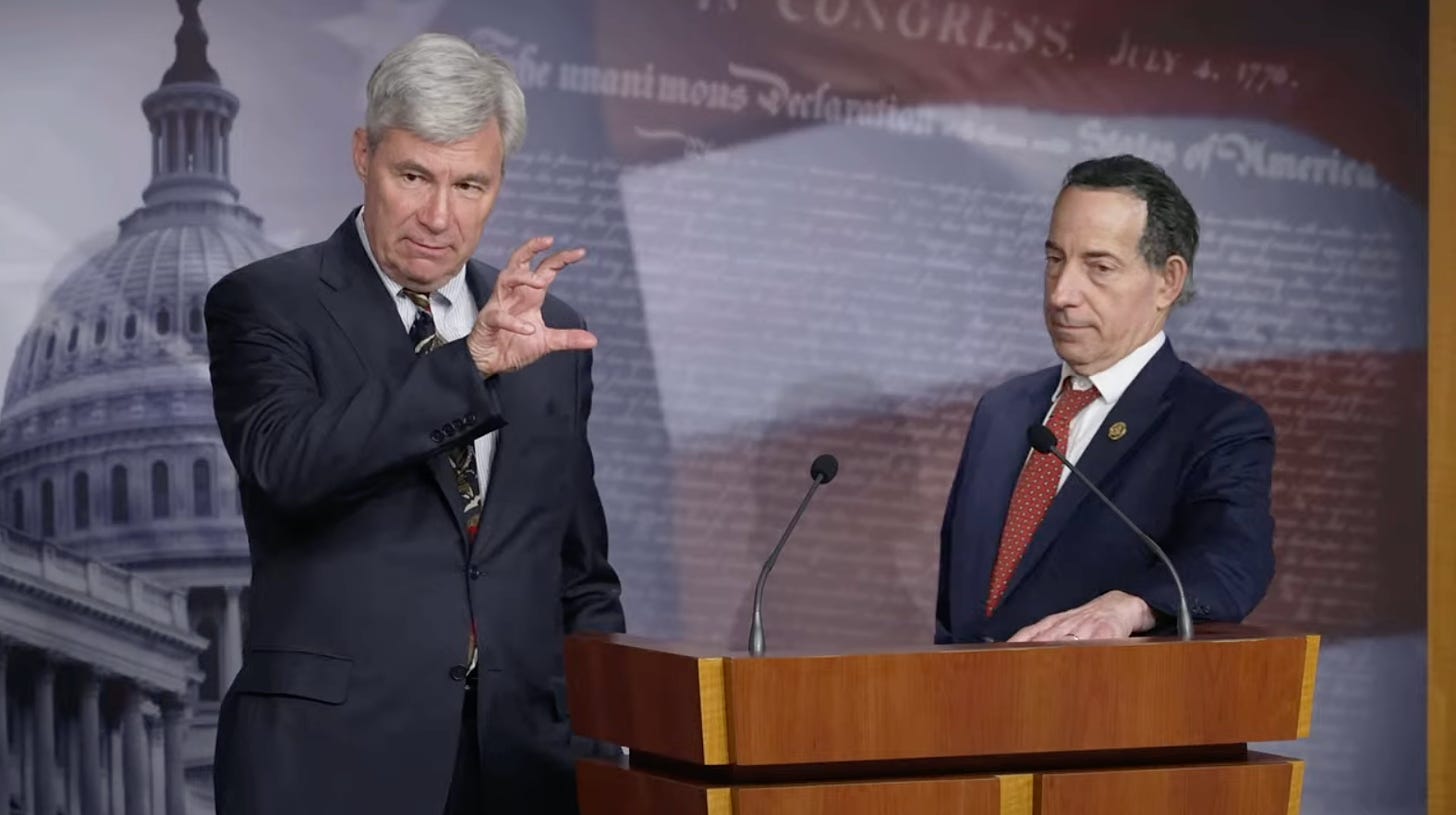
The Democrats leading the years-long congressional investigation into Big Oil’s climate deception are formally asking the Department of Justice to step in.
In a letter to Attorney General Merrick Garland on Wednesday, Senate Budget Committee Chairman Sheldon Whitehouse (D-RI) and House Oversight Committee Chairman Jamie Raskin (D-MD) asked the DOJ to launch a probe into fossil fuel climate disinformation in the same manner that it investigated tobacco companies in the 1990s for deceiving the public about the health risks of smoking.
“We believe that there is adequate evidence that fossil fuel industry companies and trade associations may have violated one or more federal statutes,” the lawmakers said. They urged Garland to take action “as a matter of basic due diligence.”
In conversations with HEATED, climate accountability advocates were hopeful about the letter. They called it a necessary first step toward executive-level legal action that could meaningfully limit industry-led climate disinformation—and therefore ultimately slow climate policy delay.
But if the DOJ does decide to take the same approach to Big Oil as it did with Big Tobacco, then some advocates worry the action may not go far enough. And if Trump wins re-election in November, then there’s little chance for any DOJ action at all.
What a Tobacco-like lawsuit would do—and what it wouldn’t
The impetus for Wednesday’s letter to the DOJ was a three-year joint investigation into Exxon, Chevron, Shell, BP, the American Petroleum Institute and the Chamber of Commerce. It was started by the House Oversight Committee in 2021 and taken over by the Senate Budget Committee after Democrats lost the House in 2022.
The joint investigation determined that those companies and groups “worked in concert” to confuse and mislead the public about how their products harm the environment, public health, and the economy. It also found that they engaged in a coordinated campaign to mislead the public about the industry’s commitment to fixing those problems.
The Big Oil investigation’s findings were similar to “the historic congressional investigation into deceptive practices of the tobacco industry and its trade associations,” Whitehouse and Raskin said in their letter to the DOJ.
That investigation eventually led to a 1999 DOJ lawsuit against the nation’s largest cigarette companies. The DOJ accused them of violating the civil provisions of the Racketeer Influenced and Corrupt Organizations (RICO) Act by conspiring to hide the dangers of smoking, and attempted to recover “the billions of dollars the federal government spends each year on smoking-related health care costs.”
In 2006, a federal judge ruled in the DOJ’s favor, with one exception: She didn’t make the tobacco industry pay up. The 1,653-page ruling determined that tobacco companies only had to stop their deceptive marketing practices, and had to buy newspaper ads detailing the truth about smoking's health effects.
In Wednesday’s press conference, Whitehouse emphasized that this was the type of legal outcome he expected to arise from the Big Oil investigation and letter to Garland: Civil, not criminal. Behavioral, not financial.
“The right-wing fossil fuel-funded faux-outrage machine has accused me of trying to criminalize dissent,” he said. “Let’s be absolutely clear: the DOJ tobacco lawsuit filed in 1999 was a civil—civil—proceeding … The end result was that the industry was ordered to stop future fraud statements and correct past fraudulent statements. No more than that. No arrests, no handcuffs, no jail, no prison.”
But that kind of case doesn’t go far enough for advocates like David Arkush, the climate program director at Public Citizen, who thinks a DOJ case against Big Oil would would be more effective if it focused on criminal charges, like homicide.
Criminal charges wouldn’t be levied against individual executives, so no one would go to jail, Arkush said. But criminal charges, he argued, would necessitate larger penalties and more serious reform of the corporate entities.
“I would like to see [the DOJ] bring criminal charges, not just civil charges,” he said. “And I would like them to go after not just deception, but the underlying harms the deception caused. … We’re talking about killing people.”
“This is the first step toward bringing a case”
In the end, it doesn’t quite matter what Whitehouse or Arkush or anyone else wants from Garland or the DOJ. Now that the letter is in the agency’s hands, the agency alone will decide what type of charges—if any—are most appropriate to bring.
And that is the biggest reason the letter is important, Arkush said: Because prosecution can’t happen without a DOJ lawsuit; and a DOJ lawsuit can’t happen without a DOJ investigation.
“This is the first step toward bringing a case,” he said. ”There is zero chance the Justice Department would take action without investigating first.”
And even without a DOJ lawsuit, a DOJ investigation alone could be fruitful in dealing with the fossil fuel industry’s obstructive tactics. During the congressional investigation, Democrats accused the oil companies and trade associations of withholding thousands of pages of subpoenaed materials; unlawfully redacting subpoenaed documents; and purposefully inundating investigators with meaningless material.
“DOJ has strong investigative powers and could discover a lot more information about wrongdoing,” Arkush said. “That may seem surprising because what's in the public record is already so damning. But as the Whitehouse-Raskin letter makes clear, there's reason to suspect the industry is hiding even worse information.”
In addition to having investigative powers, the DOJ also has peer pressure power. Simply knowing the DOJ is considering action might embolden attorneys general and district attorneys around the country to take action, too, Arkush said. A DOJ investigation might also be a strong enough signal to alter the industry’s conduct, too.
Most importantly, however, a DOJ investigation into Big Oil would require a U.S. Attorney General interested in undertaking one. It’s yet unclear if Merrick Garland is that person; the DOJ declined to comment.
But what can be said for sure is that, if Trump is re-elected, there will be no such person for four more years. At least, that’s the minimum, if he decides to leave.
The journalism you’re consuming is 100 percent funded by its readers. If you value it, and want to help grow HEATED’s ability to hold the powerful accountable, please consider becoming a paid subscriber.
Your subscription will not only help keep HEATED free for everyone, it will help us keep growing our newsroom, so we can produce even more high-quality content that the fossil fuel industry doesn’t want you to read.
Bonus information
To get a quick idea of how the fossil fuel industry might be reacting to the letter, Arielle reached out to Senator John Kennedy, heavily oil-funded Republican from Louisiana.
Jess Andrews, Kennedy’s communications director, replied: “The senator believes that Democrats’ persecution of sustainable energy sources is illogical and dangerous and doesn’t support this call for an investigation.”
Arielle followed up to ask what Kennedy meant by “sustainable energy sources,” but did not receive a reply as of press time.
Previous HEATED coverage:
Misleading climate ads explode ahead of Big Oil hearing, October 2021.
Open thread: the Big Oil hearing, October 2021.
Big Oil is getting subpoenaed, October 2021.
An imaginary memo from Big Oil to Republicans, November 2021.
Ro Khanna's quest to expose Big Oil, September 2022.
Listen to our interview with Rep. Ro Khanna, September 2022.
New internal Big Oil documents just dropped, April 2024.
Charge Big Oil with conspiracy, former tobacco prosecutor says, May 2024.
Catch of the Day: We sadly had to skip Fish’s famed section earlier this week, but boy do we have a good one today to make up for it.
Tony is a three-year-old Pembroke Welsh Corgi. He's originally from New York but has recently been enjoying the lush forests of the Pacific Northwest.
Tony enjoys: snatching tacos out of unsuspecting hands, looking at deer, grunting, and being the boss.
Tony has been reader Olivia’s companion and vital source of joy as she tries to drag herself through graduate school at Bard's MBA in Sustainability while working full-time.
You’ve got this, Olivia!! We believe in you and so does Tony.
Want to see your furry (or non-furry!) friend in HEATED? It might take a little while, but we WILL get to yours eventually! Just send a picture and some words to catchoftheday@heated.world.






I think "sustainable energy sources" means "companies I can count on to continue funding my campaigns". Seems a reasonable translation.
For those of us old enough to remember all of the years of litigation to finally bring down the tobacco industry, that will be nothing compared to what big oil has to bring to bear against any suits. This will go two ways. The DOJ will file it in a deep hole there, never to to see the light of day again until Garland is just a bad memory or it will be taken up by some young aggressive group of federal lawyers and take decades to bring to any conclusion. I will likely be long gone by then, along with a large portion of the poorer populations living near any fossil fuel industry infrastructure. That is how badly these global corporations own the politicians and governments.